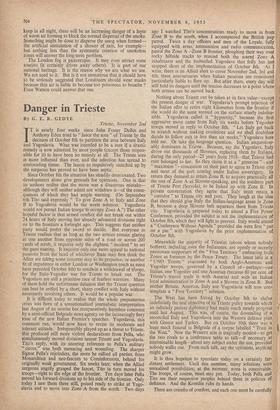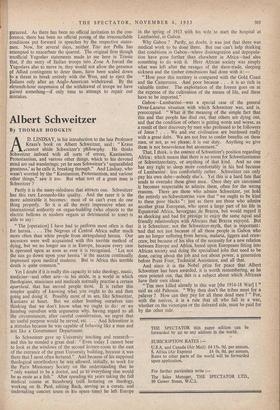Danger in Trieste
By G. E. R. GEDYE Trieste, November 2nd IT is nearly four weeks since John Foster Dulles and Anthony Eden tried to " lance the sore " of Trieste by the decision of October 8th to partition the area between Italy and Yugoslavia. What was intended to be a sure if a drastic remedy is now admitted by most people (except those respon- sible for it) to have been no remedy at all. The Trieste sore is more inflamed than ever, and the infection has spread to surrounding tissue. The lancet so impulsively snatched up by the surgeons has proved -to have been septic.
Since October 8th the situation has steadily deteriorated. Two developments alone give grounds for optimism. One is that its authors realise that the move was a disastrous mistake— although they will neither admit nor withdraw it—of the conse- quences of which they had ample warning. (On September 6th Tito said expressly " To give Zone A to Italy and Zone B to Yugoslavia would be the worst solution. Yugoslavia would not permit Italian troops to occupy Zone A.") The other hopeful factor is that armed conflict did not break out within 24 hours of Italy moving her already advanced divisions right on to the frontiers a fortnight ago. This suggests that neither party would prefer the sword to decide. But everyone in Trieste realises that as long as the two armies remain glaring at one another from opposite sides of a road or across 200 yards of scrub, it requires only the slightest " incident " to set the guns roaring. It requires only. one more appeal to national passions from the head of whichever State may first think the Allies are taking some concrete step to its prejudice, or another fit of impatience in either London or Washington (such as must have preceded October 8th) to result-in a withdrawal of troops; for the Italo-Yugoslav war for Trieste to break out. The Yugoslays are still a primitive race of fearless warriors. Many of them hold the unfortunate delusion that the Trieste question can best be settled by a short, sharp conflict with Italy without necessarily involving others. It would be a popular war.
It is difficult today to realise that the whole preposterous crisis was born of a sensationalised journalistic interpretation last August of an unwise but comparatively harmless comment by a semi-official Belgrade news agency on the increasingly fiery tone of the new Italian Premier's speeches. Yugoslavia, this comment ran, would now have to revise its moderate and tolerant attitude. Irresponsibly played up as a threat to Trieste, this produced still more violent declarations from Pella, who simultaneously moved divisions nearer Trieste and Yugoslavia. Tito's reply, with its sneering reference to Pella's military " circus," was both menacing and wounding. The sharper Signor Pella's rejoinders, the more he rallied all parties, from Monarchists and neo-fascists to Cominformists, behind his originally weak government. Six weeks later, when the Allied surgeons angrily grasped the lancet, Tito in turn moved his troops—right to the edge of the frontier. Ten days later Pella moved his forward divisions up to his side of the frontier. Only today I saw them there still, poised ready to strike at Yugo- slavia and to move into Zone 'A from the north. Two days ago I watched Tito's concentrations ready to move in from Zone' B to the south, when I accompanied the British jeep patrol. Twice a day officers and men of the Loyals, fully equipped with arms, ammunition and radio communication, patrol the Zone A—Zone B frontier, ploughing their way over rocky hillside tracks to remind both the scared Zone A inhabitants and the embattled Yugoslays that folly, has just stopped short of the implementation of October 8th. As I write, there is an Allied alert to cover November 2nd, 3rd and 4th, three anniversaries when Italian passions are considered particularly liable to flare up. But after them, every day will still hold its dangers until the tension decreases to a point where both armies can be moved back.
Nothing about Trieste can be taken at its face value—except the present danger of war. Yugoslavia's prompt rejection of the Italian offer to retire eight kilometres from the frontier if she would do the same seemed on the surface utterly indefen- sible. Yugoslavia called it " hypocrisy," because the first aggressive move came from Italy six weeks before Yugoslav troops moved in reply to October 8th. " Let Italy get back to scratch without making conditions and we shall doubtless decide to follow suit in less than six weeks,"' Yugoslays here told me. Or take the language question. Italian unquestion- ably dominates in Trieste. Because, say the Yugoslays, Italy drove out thousands of Slovenes, replacing them by Italians, during the only period-25 years from 1918—that Trieste had ever belonged to her. So they claim it as a "generous "—and " maximum "—concession on their part to agree to Trieste city and most of the port coming under Italian sovereignty. In return they demand. to retain Zone B, to acquire practically all the rest of Zone A as Slovene-speaking, and the southern part of. Trieste Port (Scrvola), to be linked up with Zone B. In private conversation they agree that Italy must retain, a ` corridor " to Trieste city and port. They laugh at the idea that they should give Italy the Italian-language areas in Zone B, because a deep Slovene belt separates them from Trieste city. Yugoslavia is prepared today to attend a Five Power Conference, provided the subject is not the implementation of October 8th, which they will fight to prevent. Italy would attend a " Conference Without Agenda " provided she were first " put on a par " with Yugoslavia by the prior implementation of October 8th.
Meanwhile the majority of Triestini (about whom nobody bothers), including even the Italianates, are openly or secretly passionate supporters of the " Free Territory " embracing both Zones as foreseen by the Peace Treaty. The latest idea is a " UNO Trieste " evacuated by both Anglo-Amercan and Yugoslav troops, governed by a Council of—perhaps—one Italian, one Yugoslav and one Austrian (because 80 per cent. of Trieste's .transit trade is with Austria) and with an Italian local administration in Zone A and a Slovene in Zone B. But neither Britain, America, Italy nor Yugoslavia will now con- template a " Free Territory " solution.
The West has been forced by October 8th to shelve indefinitely the real objective of its Trieste policy towards which an infinitely patient diplomacy had made much steady progress until last August. This was, of course, the dovetailing of a reconciled Italy and Yugoslavia into the Western defence plan with Greece and Turkey. But on October 10th there was a huge mock funeral in Belgrade of a corpse labelled " Trust in the West." Now the Western aim is tragically modest—to get the two rivals to a conference table to talk—if necessary at interminable length—about any subject under the sun, provided nobody walks out. From such talk, say the optimists, anything might grow.
It is thus hopeless to speculate today on a certainly far- distant settlement. Until this summer, many solutions were unrealised possibilities; at the moment, none is conceivable. The troops, of course, must stay put. Today, both Pella and Tito see their respective peoples behind them in policies of defiance. And the Kremlin rubs its hands.
There are crumbs of comfort, and each one must be carefully garnered. As there has been no official invitation to the con- , ference, there has been no official posing of the irreconcilable conditions put forward in speeches by the respective states- . men. Now, for several days, neither Tito nor Pella has attempted to exacerbate the quarrel. The original firm though unofficial Yugoslav statements made to me here in Trieste that, if the entry of Italian troops into Zone A forced the Yugoslays also to move in, they would not allow the presence Qf Allied contingents to deter them, have been scaled down to a threat to break entirely with the West, and to eject the Italians only after an Anglo-American withdrawal. By the eleventh-hour suspension of the withdrawal of troops we have gained something—if only time to attempt to repair our mistakes.



































 Previous page
Previous page